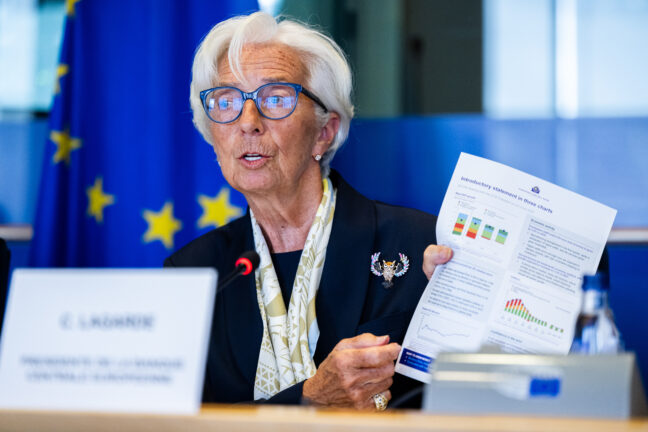The prospect of a European digital currency, concerns over commodity prices, and the ECB’s unrelenting focus on inflation dominated Monday’s monetary dialogue between Christine Lagarde, the bank’s president, and members of the Parliament’s ECON Committee.
Christine Lagarde, European Central Bank President, addressed the European Parliament on 23 June, detailing the challenges and opportunities facing the eurozone amid a complex global economic landscape. She emphasised the growing prominence of digital assets and the importance of maintaining focus on inflation goals (as opposed to other considerations).
Heightened pressures
In her opening statement, Ms Lagarde underlined the ECB’s preparedness to confront “exceptionally high” economic uncertainty. Ongoing geopolitical conflicts, particularly in the Middle East, could significantly disrupt energy supplies via the Strait of Hormuz. This, in turn, may heighten inflationary pressures on the eurozone economy. “This is a source of concern. It’s a point that we have to monitor very carefully,” she stressed—before adding that the ECB is in a good position to withstand the pressures.
The ECB President would then quickly veer towards to the subject of digital currencies. She noted the implications of rising cryptoassets, particularly stablecoins. She remarked that cryptoassets have surged from a market capitalization of less than €200bn in early 2020 to €2.7tn this year. This explosive growth, however, has raised substantial concerns for regulators and financial institutions. Ms Lagarde stated, “These characteristics render such assets unsuitable as a reliable means of exchange and expose investors to significant risks.”
Survey data revealed that about 10 per cent of households in selected euro area countries currently hold cryptoassets, with another 14 per cent expressing interest in future purchases. As she observed, increased exposure to unbacked cryptoassets raises the risk of sharp price corrections, which could reverberate through the broader financial system. Lagarde stressed the urgency to create sound governance systems for stablecoins, particularly as they operate across international boundaries, underscoring the ECB’s commitment to leading in the establishment of regulatory measures.
You might be interested
The digital imperative
Ms Lagarde also spotlighted the pivotal role of the proposed digital euro, framing it as a potential counter to the rising influence of private digital currencies. “A legislative framework to pave the way for the potential introduction of a digital euro should be in place rapidly, please,” she told the committee.
ECB’s Governing Council hopes to vote on launching a digital euro in autumn. This, however, is impossible before the European Parliament passes the necessary legislation. The European Commission proposed digital euro legislation in June 2023, but not much has happened since.
“Accelerating progress towards a digital euro is a strategic priority,” Ms Lagarde said, claiming that such an asset would not only provide consumer protection but also enhance Europe’s financial sovereignty. The digital euro, she argued, could offer advantages that currently exist within only a few digital payments systems, including universal accessibility and guaranteed value.
Additionally, she highlighted that European citizens currently experience an all-time high support for the euro area, which has reached 83 per cent, the highest since the euro’s inception. Ms Lagarde articulated the necessity for Europe to enhance its economic competitiveness, calling for prompt adoption of proposals in pursuit of greater productivity and resilience in the market. “Now is the time to make the euro area economy more productive, more competitive, more resilient,” she asserted, emphasizing the urgency of reforms
The Moscow clique
It was this remark (along with some of Ms Lagarde’s previous utterations on the topic of the unanimity principle guiding much of the Union’s decision-making) what set off a confrontation during the following Q&A session. It was, not shockingly, a Hungarian member to take issue with Ms Lagarde’s views.
„My question is on your words on qualified majority voting. I was quite shocked that you said you are speaking against the veto, saying that it should no longer be allowed to stand in the way of the collective interest of the other 26 member states. Meanwhile, veto is for strategic and sovereignty issues a legal way of decision-making in the European Union under the treaties,“ MEP Enikő GYŐRI (PfE/HUN) said. (You guessed it: back home, Ms Györi is a member of Fidesz, the party of Prime Ministr Viktor Orbán, who regularly uses the veto in order to blackmail fellow Europeans, to push pro-Putin policies, or both.)
“I try to stay as much as possible outside the political arena. I was in that world. I’m no longer in that world,“ Ms Lagarde replied, before hitting back hard. “But I’m also practical. I suggest that having (various important) projects blocked by one or two members who do not see them fit for their own national purposes is a hurdle,“ the ECB chief delivered a diplomatic equivalent of “just look at you“.
The spy who asked her
Another voice trying to shield the veto from common sense belonged to the maverick MEP Fernand Kartheiser (NI/LUX). The member from Luxembourg had, earlier this month, to endure the indignity of losing his the ECR faction membership after his friendly trip to Moscow last May (it raised eyebrows as Mr Kartheiser used to be a Soviet spy during the Cold War).
“I don’t think that the European Central Bank should get involved into institutional questions such as unanimity or vote by qualified majority,“ the MEP said. “I think that’s more of our business and the member states than that of the European Central Bank. Also, I would like to recall that common debts are actually forbidden by our treaties, so we should not go into such policies.“ (Ms Lagarde ignored this part of the question.)
Inflation rules
Another point of contention materialised thanks to MEP Fabio De Masi (Left/GER). “Madame la Presidente, you said something earlier which worried me a little bit, I may admit. You said that the overriding tool to fight inflation should be the interest rate. Now, to the hammer of the interest rate, every problem looks like a nail,“ the Italian-German member said before mentioning that recent inflationary episodes were mainly driven by supply-side shocks and bottlenecks. He fretted, “So could I read your statement as suggesting that the best the ECB could do (if this happen again) would be raising interest rates and push the costs of adjustment mainly to the working people of Europe?“
I’m practical. I suggest that having one or two members block (various important) projects because they do not see them fit for their own national purposes is a hurdle. – Christine Lagarde, ECB President
Ms Lagarde did not flinch. “Well, thank you so much. Allow me to clarify the fact that in the face of a supply shock, obviously the central bank is going to be attentive to how persistent, how deep that supply shock is going to be. And the key symptom that we would have in order to put the diagnosis on the table is going to be the inflation expectations. And that’s what we have to be absolutely attentive to,“ the wily old fox deadpanned.
In other parts of the dialogue, the ECB President projected that inflation in the eurozone would stabilize around the ECB’s target of two per cent, despite significant downside risks to economic growth. “At the current interest-rate levels, we believe that we are in a good position to navigate the uncertain circumstances,” she stated confidently. Her reframing of the ECB’s monetary policy approach emphasised a data-dependent strategy, further articulating that decisions would be made “meeting-by-meeting.” This reflects a cautious yet responsive posture that acknowledges the unpredictable nature of the current economic climate.
A complex picture
Developments in international trade, particularly the US-China tensions and tariff implementations that could have ripple effects across Europe, further compound the inherent uncertainty. Ms Lagarde conveyed that while the eurozone’s private sector showed signs of modest growth, “the private sector barely grew this month as trading and geopolitical uncertainty keeps companies from investing and households from spending.” With analysts predicting a stabilization of inflation, the interplay of reduced consumer spending and investment presents a complex picture for monetary policymakers.
In outlining the ECB’s economic forecasts, Ms Lagarde said she expected the euro area’s economy to grow by 0.9 per cent in 2025, with projections of 1.1 per cent in 2026 and 1.3 per cent in 2027. This anticipated growth comes amid a backdrop of rising energy prices and ongoing geopolitical strife that could impede recovery efforts. While she acknowledged the recent strong expansion at the start of the year, she cautioned that there remains considerable risk bolstering the case for a cautious monetary policy stance.











